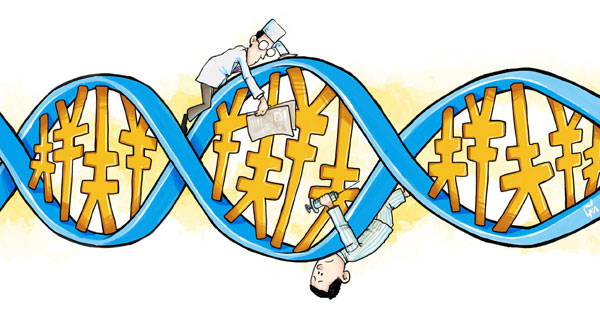Genetic predictions fail to pass the test
By Shan Juan (China Daily) Updated: 2016-04-06 09:10

China has launched a strategic initiative to boost the use of precision medicine - treatments specifically designed for individual patients - that will receive government funding of 60 billion yuan ($9.2 billion) by 2030.
With a huge human gene bank as the foundation and gene-sequencing as the tool, the initiative aims to develop more-targeted diagnostics and treatments for specific diseases through advanced medical science and technology.
Major focuses will include cardiovascular disease, diabetes and selected cancers, which are currently the main killers in China, said Cao Xuetao, president of the Chinese Academy of Medical Sciences and Peking Union Medical College.
Cao said the essence of precision medicine centers on methods of prevention, diagnosis and treatment that take individual variability, particularly genomics (the study of the structure, function, evolution, and mapping of genomes), into consideration. Modern tools, such as genomics and bioinformatics - the collection and analysis of complex biological data, such as genetic codes - will help to achieve that.
"It will matter greatly to both the individual patient and the government because it can help provide the most effective treatments for individual patients and also reduce medical costs overall," he said.
To kick-start the initiative, the Chinese Academy of Sciences has solicited the first 4,000 volunteers for genetic studies, but that's just the beginning, according to Cao. "We are planning a gene data pool covering at least several million Chinese. The more data we have, the more precise the prevention and treatment will become," he said.
Francis S. Collins, director of the United States National Institute of Health, said collaboration will be the key to success.
"We'd like to cooperate with China in precision medicine. To bring these data sets together is the only way to make the collaboration work, and make the whole greater than the sum of its parts," he said.
"We are all one part of the family of human beings and we have to do it (develop the tests) together if we want to know important things about human health," he said.
In the long run, it will teach people more-effective ways to stay healthy and also save the government considerable expenditure on medical bills, he said.
"So there is also an economic driver here, to come up with ways of reducing healthcare costs," he added.
However, industry insiders said more preparation in relative research and rule setting concerning genetic data sharing will need to be undertaken before that can happen.
- Gene detection lab built in Karamay
- Chinese scientists decode gene sequence of imported Zika virus
- Big data platform for gene analysis located in E-town
- Monkeys get autism gene in quest for treatments
- Gene-editing technique offers hope to treat muscle disorder: studies
- Study reveals gene mutation linked to muscle damage, heart problems
- Big gene bank to anchor precision medicine
- Gene therapy cures adult leukemia patient in China
- Blue eyes or brown? Blonde or brunette? The age of easy gene-editing is here
- Superbug gene against all forms of antibiotics discovered in China
- Expansion urged for gene test that offers early hearing loss detection
- Pig gene technology promises big benefits
- Zhubi Reef lighthouse comes to life
- More inspection dogs to work at entry-exit ports
- Ministry doubles water release to help drought-hit Vietnam
- Overseas returnees still in demand, despite challenges
- China financial risks under control: Bloomberg economists
- China-Myanmar ties at new 'starting point', says foreign minister
- Internet users hoping to catch glimpse of mating pandas
- Beijing announces decision to restrict trade with Pyongyang
- First microgravity satellite sent into orbit from Gansu
- Xinjiang launches huge project to help rural students








